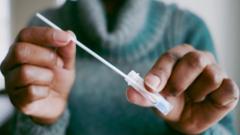Are Health Self-Test Kits Really Accurate? A New Study Reveals Shocking Truth!

Understanding the Risks and Regulations of Home Health Tests
Home health tests have surged in popularity as individuals seek immediate answers regarding their health conditions. While these kits offer convenience and autonomy, they also present significant concerns regarding their accuracy and reliability. Recent studies have illuminated the shortcomings of these self-testing kits, emphasizing the urgent need for stricter regulations to safeguard consumer health. This article explores the current landscape of home health tests, the associated risks, and the potential need for regulatory reforms.
The Rise of Home Health Tests
In recent years, the market for home health tests has expanded dramatically. From assessments for bowel cancer to menopause tests, these kits are available in supermarkets and pharmacies across the UK. The allure of quick and private health assessments has driven a growing consumer base to explore these options. However, the convenience of these tests often overshadows their potential drawbacks.
Research Findings on Self-Test Kits
Recent research conducted by the University of Birmingham analyzed 30 different self-test kits priced between £1.89 and £39.99. These studies, published in the British Medical Journal (BMJ), revealed alarming statistics regarding the reliability of these kits:
- Only 14 out of the 30 kits provided any information on accuracy.
- Fewer than 25% offered clear guidance on the next steps after receiving results.
- Almost half of the kits recommended consulting a healthcare professional regardless of the result, potentially burdening NHS services.
These findings indicate a significant gap in the information provided to consumers, which can lead to confusion and misinterpretation of results.
The Importance of Accurate Self-Testing
According to Prof. Jon Deeks, who led the research, the lack of stringent regulations compromises consumer safety. He stated, "Self-tests have a clear potential to improve public health. However, for them to be beneficial and not harmful, they must be proven to be accurate, easy to use, and supported by clear instructions." The potential for false reassurance or unnecessary anxiety is a critical concern in the context of health management.
Historical Context of Self-Testing in the UK
Self-testing is not a new concept in the UK; pregnancy tests, for example, have been available since 1971. More recently, during the COVID-19 pandemic, lateral flow tests became a household item. While these tests have shown to increase testing uptake in underserved communities, the current unregulated market for health kits raises questions about equity and access.
Widening Inequalities and Exploitation Risks
The BMJ warns that providing self-testing options based on financial capability rather than medical necessity can exacerbate inequalities. Vulnerable populations may be disproportionately affected by the proliferation of these kits, leading to potential exploitation. The focus should be on ensuring equal access to reliable health information and testing options.
Quality and Accuracy Concerns
As the UK self-test market is projected to grow, with revenues expected to reach £660 million by 2030, the need for quality assurance becomes increasingly crucial. Many kits claim high accuracy rates, sometimes exceeding 98%, but the supporting evidence is often lacking or undisclosed. This lack of transparency raises concerns about the validity of these claims and the overall safety of using such tests.
Regulatory Response and the Role of MHRA
The Medicines and Healthcare products Regulatory Agency (MHRA) is currently reassessing the regulatory framework governing self-test kits in response to the findings from the University of Birmingham study. Joseph Burt, Head of Diagnostics and General Medical Devices at MHRA, acknowledged the importance of transparency in the industry and indicated that new measures are being explored. These measures may include:
- Requiring manufacturers to publish summaries of clinical evidence.
- Encouraging consumers to look for CE or UKCA marks on kits.
- Urging individuals to read instructions carefully and consult healthcare professionals when in doubt.
Such initiatives aim to enhance consumer safety and ensure that home health tests are both reliable and effective.
The Need for Consumer Education
While regulatory measures are essential, consumer education plays a pivotal role in navigating the complexities of home health tests. Individuals must be informed about the limitations of these kits and understand that they are not substitutes for professional medical advice. This understanding can empower consumers to make better health decisions and mitigate the risks associated with inaccurate test results.
FAQs About Home Health Tests
What are home health tests?
Home health tests are diagnostic kits that individuals can use to check for various health conditions in the privacy of their homes. They cover a range of issues, including hormonal changes, vitamin deficiencies, and potential diseases.
How accurate are home health tests?
The accuracy of home health tests can vary significantly. Many kits may claim high accuracy rates, but the supporting evidence is often not disclosed, raising concerns about their reliability.
What should I do if I receive an abnormal result from a home health test?
If you receive an abnormal result, it is crucial to consult a healthcare professional for further evaluation and guidance, as self-tests are not a replacement for professional medical advice.
Are home health tests regulated in the UK?
Currently, the regulation of home health tests is under review by the MHRA, which is exploring new measures to enhance transparency and consumer safety.
How can I ensure I'm using a reliable home health test?
To ensure reliability, look for tests that have a CE or UKCA mark, read the instructions carefully, and seek medical advice if uncertain about the results.
As the landscape of home health testing continues to evolve, consumers must remain vigilant and informed. Balancing the convenience of self-testing with the need for accuracy and reliability is essential to safeguard public health. Will you trust a home health test for your next health inquiry, or do you prefer the assurance of professional medical advice? #HomeHealthTests #ConsumerSafety #HealthAwareness
Published: 2025-07-24 01:42:11 | Category: technology



